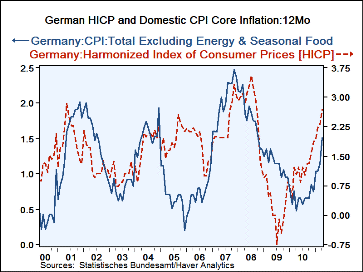 Global| May 11 2011
Global| May 11 2011Euro-Area Inflation Led by Developments in Germany?
Summary
The German CPI is up by 0.3% in April. Headline German CPI inflation rose by 0.2%. Core CPI inflation rose by 0.3%. Broadly, these measures of German inflation continue to accelerate. Core inflation reached it low point in 2009 began [...]
 The German CPI is up by 0.3% in April. Headline German CPI inflation rose by 0.2%. Core CPI inflation rose by 0.3%. Broadly, these measures of German inflation continue to accelerate.
The German CPI is up by 0.3% in April. Headline German CPI inflation rose by 0.2%. Core CPI inflation rose by 0.3%. Broadly, these measures of German inflation continue to accelerate.
Core inflation reached it low point in 2009 began to accelerate then paused late in the year and into 2010 before resuming its acceleration.
Headline inflation is rising again at a rapid pace as energy and food prices are inflating.
The headline domestic measure of CPI inflation has decelerated over three months compared to six months, and dropped its pace to 3% from 3.5%. But this pace is still up sharply from 2.2% Yr/Yr and although the ECB target is for an ECB-wide rate of inflation the Germany pace is in own way excessive. Core inflation still is above the pace prescribed as a maximum for the headline rate. It has been accelerating steadily.
The diffusion for sequential inflation rates is still adverse but is not worsening. Three-month VS six month inflation finds a diffusion calculation of 54.5% indicating that the inflation has worsened in 54.5% of the categories on balance. From six-months to 12-months inflation worsened in 63% of the categories. The 12-month compared to year-ago inflation rate is also up in 63% of the categories. These are net comparisons that are like the readings we get from the ISM each month. Values above 50% show net acceleration; values below 50% show net deceleration in inflation across categories. Diffusion is a measure of breadth.
Despite the worsening trend for inflation, it is not worsening at an accelerating pace. Diffusion has backtracked over three-months compared to six-months and 12-months. Inflation is still getting its main push from energy and food. Beyond that, inflation pressures do not appear to be spreading or worsening.
And this is only for Germany not for the Zone as a whole. There is a lot of weakness in other zone countries. That realization seems to have stopped the ECB from continuing on its path of rate increases as German inflation is not accelerating at a fast enough pace to dominate other zone-wide concerns, such as those about growth and debt issues.
| German HICP and CPI details | |||||||
|---|---|---|---|---|---|---|---|
| Mo/Mo % | SAAR % | Yr/Yr | |||||
| Apr-11 | Mar-11 | Feb-11 | 3Mo | 6Mo | 12Mo | Yr Ago | |
| HICP Total | 0.3% | 0.5% | 0.3% | 4.4% | 4.1% | 2.7% | 1.0% |
| Core | |||||||
| CPI | |||||||
| All | 0.2% | 0.5% | 0.1% | 3.0% | 3.5% | 2.2% | 1.2% |
| CPIxF&E | 0.3% | 0.3% | 0.0% | 2.3% | 1.9% | 1.5% | 0.5% |
| Food | 0.1% | -0.2% | 0.9% | 3.2% | 2.9% | 2.0% | 1.2% |
| Alcohol | 0.1% | 0.4% | -0.4% | 0.4% | 0.5% | 0.0% | 3.4% |
| Clothing & Shoes | -0.1% | 1.4% | -1.1% | 0.8% | 1.5% | 1.0% | 1.0% |
| Rent &Util | 0.3% | 0.4% | 0.4% | 4.4% | 4.8% | 3.1% | 0.9% |
| Health Care | 0.1% | 0.1% | 0.1% | 1.1% | 0.4% | 1.2% | 0.2% |
| Transport | 0.3% | 1.0% | 0.1% | 5.7% | 7.4% | 4.3% | 4.7% |
| Communication | -0.5% | -0.2% | -0.1% | -3.2% | -3.4% | -2.8% | -1.8% |
| Rec &Culture | 1.2% | 0.1% | -0.5% | 3.2% | 2.2% | 2.2% | -1.5% |
| Education | -0.8% | 0.4% | -0.3% | -3.0% | -1.0% | 1.6% | -1.0% |
| Restaurant & Hotel | 0.5% | 0.0% | 0.0% | 2.2% | 1.5% | 1.4% | 1.2% |
| Other | 0.3% | 0.4% | 0.9% | 6.4% | 3.1% | 2.4% | 0.9% |
| Diffusion | 54.5% | 63.6% | 63.6% | ||||
| Type: | Diffusion: Current Compared to | 6Mo | 12Mo | Yr-Ago | |||
Robert Brusca
AuthorMore in Author Profile »Robert A. Brusca is Chief Economist of Fact and Opinion Economics, a consulting firm he founded in Manhattan. He has been an economist on Wall Street for over 25 years. He has visited central banking and large institutional clients in over 30 countries in his career as an economist. Mr. Brusca was a Divisional Research Chief at the Federal Reserve Bank of NY (Chief of the International Financial markets Division), a Fed Watcher at Irving Trust and Chief Economist at Nikko Securities International. He is widely quoted and appears in various media. Mr. Brusca holds an MA and Ph.D. in economics from Michigan State University and a BA in Economics from the University of Michigan. His research pursues his strong interests in non aligned policy economics as well as international economics. FAO Economics’ research targets investors to assist them in making better investment decisions in stocks, bonds and in a variety of international assets. The company does not manage money and has no conflicts in giving economic advice.
More Economy in Brief
 Global| Feb 05 2026
Global| Feb 05 2026Charts of the Week: Balanced Policy, Resilient Data and AI Narratives
by:Andrew Cates






